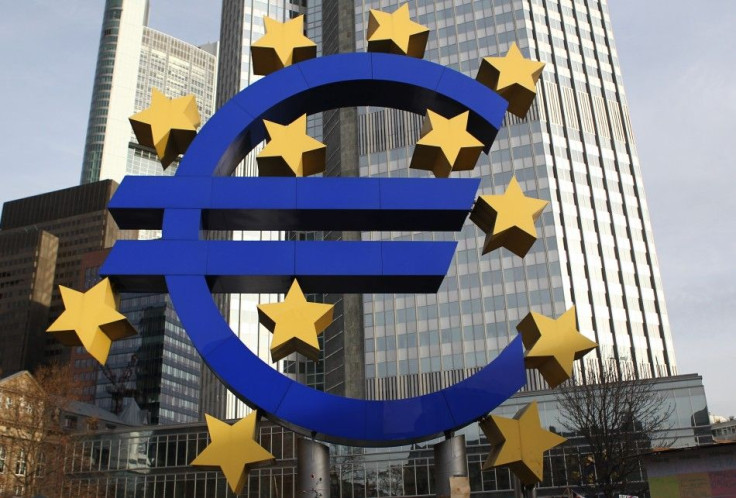Euro Zone Woes Creating Opportunities For Foreign Buyers

The euro zone's economic troubles have cut the share prices of numerous European companies, several of which have become buyout opportunities for cash-rich corporations based outside the recession-hampered monetary union.
Europe, which fell into recession in the first quarter, is seeing the value of its companies decline: One year ago the Euro Stoxx 50 closed at 3,013 while on Monday it closed near 2,450 -- about 20 percent lower.
Besides the emerging bargains in the euro zone, many European institutions holding stakes in continental companies -- especially banks -- need to raise cash, and are finding willing buyers abroad for their devalued assets.
Behind the dynamic of cheaper and cheaper European assets becoming more and more tempting for non-European buyers lies a grim reality that may extend the dynamic. Unemployment in the euro zone has reached a 15-year high -- 10.8 percent or 17 million people out of work. In the southern periphery of the 17-nation group, unemployment is well above 20 percent. Spain, for example, has an overall unemployment of more than 24 percent.
Economists expect continuing austerity measures to fuel growing ranks of jobless Europeans.
We expect it [unemployment] to go higher, to reach 11 percent by the end of the year, said Raphael Brun-Aguerre, an economist at J.P. Morgan Chase & Co. in London, according to Reuters. You have public sector job cuts, income going down, weak consumption. The economic growth outlook is negative and is going to worsen unemployment.
The trend of European entities being bought by cash-rich non-European companies is emerging across a wide array of industries.
Banking. Royal Bank of Canada (NYSE: RY), the country's largest bank, said Tuesday it will acquire the 50 percent of RBC Dexia Investor Services Ltd. it doesn't already own from its joint-venture partner Banque Internationale à Luxembourg SA for C$1.1 billion (US$1.1 billion) in cash.
French-Belgian bank Dexia, which held a huge chunk of Greek debt, was the first financial institution to be bailed out as a result of the European debt crisis.
The transaction announced today has significant strategic value to us, not only as a standalone business but also in its complementary capabilities to RBC, said Gordon Nixon, RBC chief executive.
Construction. Camargo Correa SA, Brazil's second-biggest construction company, late last week bid €2.48 billion ($3.32 billion) for the 68 percent stake it doesn't already own in Cimpor-Cimentos de Portugal SGPS SA, a publicly traded Portuguese cement company with global operations.
The offer by Camargo, which is Cimpor's largest shareholder, comes to about €5.50 per share, a premium of 10 percent from Friday's closing price. By late Monday Cimpor-Cimentos shares had risen to nearly the Camargo offering price.
Meanwhile, Votorantim Participaçõ es SA, another large Brazilian industrial company that holds a 21 percent stake in Cimpor, is expected to exercise its right to buy into a Camargo Correa-Cimpor deal without having to put in a larger bid.
Beer. Sometimes the driving force of an acquisition is simply the strength of the non-European buyer. Molson Coors Brewing Co. (NYSE: TAP), a North American brewer whose popular brands include Coors and Molson Canadian, announced Tuesday a deal to buy StarBev LP, a leading Eastern European brewer, to boost its share of a fast-growing market.
Molson Coors, which has a market capitalization over $8 billion, will pay €2.65 billion ($3.54 billion) for the company, headquartered in Amsterdam and Prague.
Molson Coors' value has been climbing steadily since last fall. On Oct. 3 its shares went for $38.34, while in afternoon trading Tuesday its shares were going for $43.09 -- a more than 7 percent gain.
Shipping. Last month U.S.-based United Parcel Service Inc. (NYSE: UPS), the world's No. 1 package courier, said it will buy struggling Dutch rival TNT Express NV (AMS: TNTE) after raising its all-cash offer nearly 6 percent to €5.16 billion ($6.8 billion). In February, TNT had a fourth-quarter net loss of €173 million.
UPS will pay €9.50 a share in cash for Europe's second-biggest express-delivery provider, up from a bid in February of €9 a share and 54 percent higher than TNT shares' closing price Feb. 16, the day before the talks were made public, the companies said in a joint statement.
Communications. Last month U.S.-based Cisco Systems Inc. (Nasdaq: CSCO) paid $5 billion for London-based NDS Group Ltd., which develops pay-TV software. The deal for NDS, whose sales have been growing at less than 10 percent per year, is set to close in the second half of this year. Cisco CEO John Chambers said the acquisition lets his company use some of its substantial overseas cash reserves.
© Copyright IBTimes 2024. All rights reserved.











